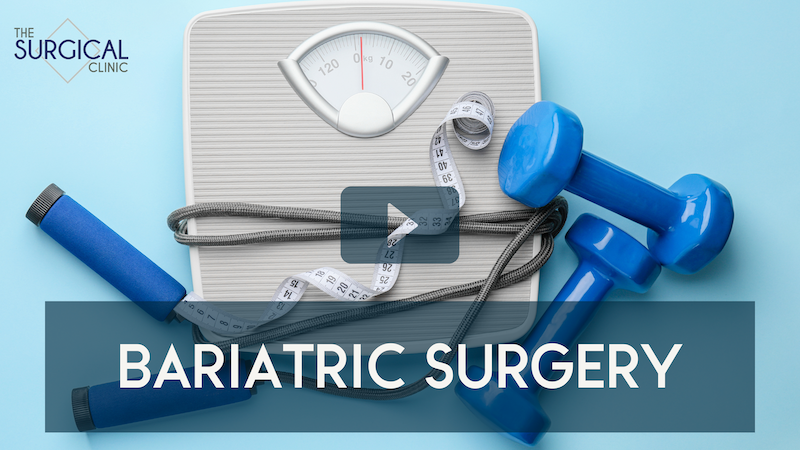Bariatric Surgery
FIND A BARIATRIC SURGEON IN NASHVILLE

Dr. Patrick Davis
General/Bariatric Surgeon
Southern Hills

Dr. George Lynch
General/Bariatric Surgeon
Downtown Nashville

Dr. James McDowell
General/Bariatric Surgeon
Downtown Nashville
BARIATRIC SURGERY IN NASHVILLE
Our bariatric surgeons are located at The Surgical Clinic (Downtown Nashville), Saint Thomas Midtown Hospital and TriStar Southern Hills Hospital in Nashville, TN. Our patients will find a highly experienced staff and highly skilled weight loss surgeons at both locations.
We are prepared to support you and your family from the morning of your surgery until the day you return home. Once home, your surgical weight loss Nashville support team will work with you to help you reach your target weight goal as you become a healthier you.
What is Bariatrics?
Bariatric surgery (also known as weight loss surgery) focuses on treating the patient’s digestive organs in order to improve weight loss, type 2 diabetes and heart disease. However, a bariatric surgeon is only one part of our department of bariatrics in Nashville, TN.
To increase the success rate for every one of our patients, our bariatrics patients will work with our team of supporting providers.
Our surgical weight loss and weight management team includes:
Board Certified Bariatric Surgeons
Exercise Physiologists
Insurance Specialists
Nurses
Nutritionists
Bariatric Surgeons
Locations
Resources
Weight loss surgery
Is bariatric surgery for weight loss right for me?
While weight loss surgery is effective at improving several health problems, it’s an intense process that is only effective in the long term. At The Surgical Clinic in Nashville, good candidates for bariatric surgery meet at least one of the following:
A Body Mass Index (BMI) of 40 or more
Are 100 pounds overweight
A BMI over 35 with an obesity-related comorbid condition, such as: Type II Diabetes, Hypertension, Obstructive Sleep Apnea, Heart Disease
We also look for candidates who tried non-surgical weight loss treatments but did not meet successful results. Remember, that bariatric surgery is not an easy fix. You will need to be committed to making long-term changes to your daily habits, including diet and exercise.
CONSIDERING BARIATRIC SURGERY?
How to choose a bariatric surgeon near me
Find Compassionate Care and Lasting Results at The Surgical Clinic
Are you ready to take control of your health and transform your life? Bariatric surgery could be the life-changing solution you’ve been searching for. At The Surgical Clinic, we understand that making the decision to undergo weight loss surgery is significant, and we’re here to support you every step of the way.
It’s important to understand that weight loss surgery is a significant step, one that requires commitment and dedication from both you and our healthcare team. Our goal here is not just about shedding pounds but improving your overall health and quality of life. Weight loss surgery isn’t a quick fix, but rather a tool to help you achieve sustainable weight loss and manage obesity-related health issues such as diabetes, high blood pressure, and sleep apnea. Throughout this process, we’ll work closely together to determine the most suitable procedure for you, ensuring that you’re fully informed and supported every step of the way.
Why Choose us for Bariatric Surgery in Nashville?
- Comprehensive Care: At The Surgical Clinic, we offer comprehensive care tailored to your individual needs. From your initial consultation to post-operative support, our experienced team is dedicated to providing personalized treatment plans and compassionate guidance throughout your weight loss journey.
- Expertise You Can Trust: Our board-certified surgeons at The Surgical Clinic are leaders in the field of bariatric surgery, with years of experience and a commitment to delivering safe, effective results. We utilize the latest surgical techniques and technologies to ensure optimal outcomes for our patients.
- Multidisciplinary Approach: Achieving long-term success after bariatric surgery requires more than just the procedure itself. That’s why at The Surgical Clinic, we take a multidisciplinary approach, collaborating with dietitians, psychologists, and other specialists to provide comprehensive support before, during, and after surgery.
- State-of-the-Art Facilities: Your safety and comfort are our top priorities. At The Surgical Clinic, our state-of-the-art facilities are equipped with the latest advancements in medical technology, ensuring a safe and comfortable surgical experience for every patient.
Transform Your Health, Transform Your Life
Bariatric surgery isn’t just about losing weight—it’s about reclaiming your health, boosting your confidence, and unlocking a brighter future. Many of our patients at The Surgical Clinic experience dramatic improvements in obesity-related conditions such as diabetes, hypertension, and sleep apnea, leading to enhanced overall well-being and quality of life.
Take the First Step Towards a Healthier You
If you’re ready to take the first step towards a healthier, happier you, we’re here to help. Contact The Surgical Clinic today to schedule a consultation with one of our experienced bariatric surgeons. Together, we’ll explore your options, address any questions or concerns you may have, and develop a personalized treatment plan that’s tailored to your needs and goals.
Don’t Wait—Start Your Journey to Better Health Today
Don’t let excess weight hold you back from living the life you deserve. With bariatric surgery at The Surgical Clinic, you can take control of your health and embrace a brighter, healthier future. Contact us today to learn more and take the first step towards a transformative change.
Bariatric Surgery
Bariatric surgery for weight loss in Nashville
Bariatric surgery or weight loss surgery is a big step for any patient. While it is highly effective at helping patients lose weight, patients of bariatric surgery (or any type of weight loss surgery) must commit to long-term lifestyle changes.
Our bariatric surgeons focus on helping each patient reach their goals, get through recovery and continue on a path to a healthier lifestyle.
Types of bariatric surgery
There are three different surgical procedures in our bariatrics & surgical weight loss practice in Nashville. All of these procedures can be used to shorten the time required to digest food or reduce the size of the stomach itself. And because these procedures are quite intense, your weight loss surgeon will partner with you to determine which approach will work best for you. They will help you consider whether open bariatric surgery or minimally invasive robotic bariatric surgery will be the best fit for you.
We are all different and our bariatric surgeons at The Surgical Clinics in Nashville understand that your weight loss journey will be unique to you. Rest assured that your Nashville bariatrics care will be customized to fit your specific physical, medical, mental, and emotional needs.
Gastric Bypass Surgery
Roux-en-Y (RNY) surgery is most commonly known as gastric bypass surgery. Gastric bypass surgery is one of the most common weight loss surgeries performed still today. This procedure involves closing off a large portion of your stomach to form a small pouch that is connected directly to your small intestine.
Gastric Balloon Surgery
Intragastric balloon surgery is a surgical treatment to reduce hunger and improve weight loss. This bariatric surgery also offers positive results for GERD, heart disease and obstructive sleep apnea.
Vertical Sleeve Gastrectomy
Vertical sleeve gastrectomy surgery (VSG) is a minimally invasive surgery for weight loss. We are pleased to also offer robotic bariatric surgery for even better weight loss surgery results in Tennessee.
Pros & Cons
BARIATRIC SURGERY
Bariatric surgery presents many benefits as well as considerations. On one hand, it offers effective and sustained weight loss, often leading to improved health outcomes and reduced risks of obesity-related conditions. However, the advantages come with potential drawbacks. Surgical risks like infection and bleeding are inherent. Plus, maintaining long-term lifestyle changes can be challenging, emotionally and practically. Weighing the pros and cons alongside individual health needs is crucial when considering bariatric surgery.
BENEFITS
Weight Loss: Bariatric surgery can lead to significant and sustained weight loss, which can improve overall health and reduce the risk of obesity-related conditions.
Relief from Medical Conditions: Many patients experience improvements or even resolution of conditions such as type 2 diabetes, hypertension, sleep apnea, and heart disease after bariatric surgery.
Improved Quality of Life: Successful weight loss can lead to increased mobility, better self-esteem, and improved mental well-being.
Long-term Health: Bariatric surgery may extend lifespan by reducing the risk of obesity-related complications.
RISKS
Nutritional Deficiencies: Due to reduced food intake and absorption, patients may develop deficiencies in vitamins and minerals, which require lifelong supplementation.
Gallstones: Rapid weight loss can increase the risk of gallstones.
Dumping Syndrome: After certain procedures, eating high-sugar or high-fat foods can lead to dumping syndrome, causing symptoms like nausea, sweating, and diarrhea.
Emotional Challenges: Rapid weight loss and lifestyle changes can lead to emotional challenges and adjustments, which might necessitate counseling or support.
POST-SURGERY LIFESTYLE CHANGES
Lifestyle changes are a crucial aspect of bariatric surgery success. Patients are encouraged to work closely with their healthcare team, including dietitians, exercise physiologists, and mental health professionals, to develop a personalized plan that supports their physical and emotional well-being while achieving their weight loss and health goals. Some lifestyle changes may include:
Post-Bariatric Surgery Lifestyle Changes
- Portion Control: Bariatric surgery reduces the stomach’s capacity, so patients must learn to eat smaller portion sizes to avoid discomfort and promote weight loss. The typical size of a meal once solids are re-introduced is a 1 cup portion. One cup is about the size of a closed fist.
- Slow Eating and Chewing: Eating slowly and chewing food thoroughly can prevent discomfort and aid digestion.
- Mindful Eating: Developing mindfulness around eating can help patients recognize true hunger and fullness cues, preventing overeating.
- Balanced Diet: After surgery, patients need to focus on consuming nutrient-dense foods that provide essential vitamins and minerals. Protein intake is particularly important to support healing and maintain muscle mass. Eat lean meats like skinless chicken breast, fish, and lean beef or pork. Other low-fat protein sources include beans and low-fat dairy, like cottage cheese and fat-free ricotta.
- Vitamin and Mineral Supplementation: Due to reduced food intake and absorption, patients may need to take vitamin and mineral supplements, like B12, iron, and calcium, as recommended by their healthcare provider.
- Hydration: Staying hydrated is still crucial after surgery. Patients should aim to drink enough water throughout the day. Refrain from carbonated beverages and alcohol.
- Avoiding High-Sugar and High-Fat Foods: Many patients experience dumping syndrome when consuming high-sugar or high-fat foods. These foods can lead to nausea, sweating, and other unpleasant symptoms.
- Regular Physical Activity: Engaging in regular exercise is important for maintaining muscle mass, promoting weight loss, and supporting overall well-being.
- Behavioral Changes: Patients are encouraged to address emotional eating habits and establish healthier coping mechanisms for stress and emotions.
- Long-Term Follow-Up: Regular follow-up appointments with the surgical team help monitor progress, address concerns, and adjust the treatment plan if needed.
BARIATRICS IN NASHVILLE
Ready to take the first step towards a healthier you? Our skilled team of board-certified surgeons, dietitians, and support specialists is dedicated to your success. Discover effective weight loss, resolution of health conditions, and improved quality of life. We offer a comprehensive approach, guiding you through pre-surgery preparation, the procedure itself, and long-term lifestyle changes.
What is bariatric surgery?
Bariatric surgery, also known as weight loss surgery, is a surgical procedure performed to help individuals who are severely overweight or obese achieve significant weight loss by reducing the size of the stomach and/or altering the digestive process.
Who is a candidate for bariatric surgery?
Candidates for bariatric surgery typically have a body mass index (BMI) of 40 or higher (or BMI of 35 or higher with obesity-related health conditions), have tried and failed to lose weight through diet and exercise, and are committed to making long-term lifestyle changes.
What are the different types of bariatric surgery?
The most common types of bariatric surgery include gastric bypass, sleeve gastrectomy, adjustable gastric banding, and biliopancreatic diversion with duodenal switch. Each procedure works differently to achieve weight loss and has its own benefits and risks.
How much weight can I expect to lose after bariatric surgery?
Weight loss results vary depending on the type of surgery, individual factors, and adherence to post-operative guidelines. On average, patients can expect to lose 50-70% of their excess body weight within the first 2 years following surgery.
Will I need to follow a special diet after surgery?
Yes, following surgery, you’ll need to transition through various stages of a post-operative diet, starting with liquids and gradually progressing to soft foods and then solid foods. It’s essential to follow your surgeon’s dietary guidelines to promote healing and maximize weight loss.
How long is the recovery period?
The recovery period varies depending on the type of surgery and individual factors. Most patients can expect to return to normal activities within 4-6 weeks, although strenuous exercise may need to be avoided for a longer period.
Will I need to take supplements?
Yes, bariatric surgery can affect nutrient absorption, so lifelong supplementation with vitamins and minerals is typically recommended to prevent deficiencies. Your healthcare team will provide specific recommendations based on your individual needs.
What are the risks?
While bariatric surgery is generally safe, like any surgical procedure, it carries risks and potential complications. These may include infection, bleeding, blood clots, leakage at the surgical site, vitamin and mineral deficiencies, and gastrointestinal issues.
Is it reversible?
While some procedures, such as gastric banding, can be reversed, most bariatric surgeries are considered permanent changes to the digestive system. It’s essential to carefully consider the decision to undergo bariatric surgery and discuss all options with your healthcare provider.
Will Insurance Cover Bariatric Surgery?
Some insurance plans cover bariatric surgery if specific criteria are met, such as a high BMI and evidence of weight-related health issues. Patients should check with their insurance provider to understand coverage details and requirements.
For patients without insurance coverage or whose procedures are not covered, we at The Surgical Clinic provide self-payment options and financing plans. Get in touch with us to see how we can help you finance your surgery.






